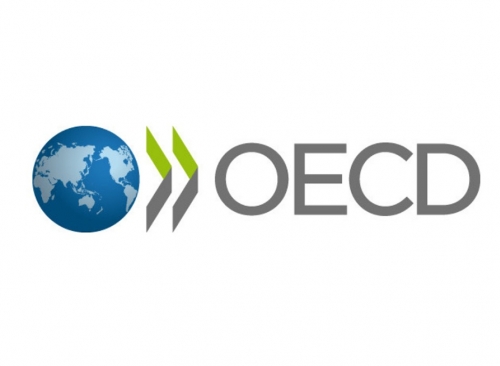

On April 16, GREEN Action Task Force Annual Meeting 2024 kicked off in Chişinău (Moldova) within the framework of the powers of the Organization for Economic Cooperation and Development (OECD). The mandate of the target group includes the EEC countries, the list of which is approved considering the aggression of Russia against Ukraine. Armenia, Azerbaijan, Georgia, Moldova, Kazakhstan, Kyrgyzstan, Tajikistan, Turkmenistan, Uzbekistan and Ukraine.
The purpose of the annual meeting in 2024 is to provide an opportunity to exchange opinions on the latest events and plans for the transition to a "green" economy, to discuss the implementation of programs and plans for 2023-2024, and the work program of the target group for 2025-2026.
Among the documents provided to the participants, there were reports of the Target Group on environmental responsibility in some countries of the EEC, such as EU4Environment brochure "Environmental compliance assurance in the Eastern Partnership countries", EU4Environment report "Environmental liability provisions in Armenia: Damage prevention and assessment", EU4Environment report "The Environmental Compliance Assurance System in Georgia. Current Situation and Recommendations", EU4Environment report "Developing environmental liability legislation in the Republic of Moldova", EU4Environment report "The environmental compliance assurance system in the Republic of Moldova: current situation and recommendations".
The Report on Armenia gives recommendations to improve the situation regarding environmental responsibility. The report with recommendations is published here.
The third session was devoted to the issues of compliance with environmental norms with emphasis on mining mineral resources. The moderator of the session, Ms. Martine Rohn-Brossard (Switzerland) noted the importance of monitoring and ensuring compliance with environmental norms in this sector.
The speakers relied on the twenty-year experience of OECD work on this issue with member countries and non-member countries, in close cooperation with environmental inspection bodies within the framework of the EU4Environment Action program, aimed at supporting the countries of the Eastern Partnership - Armenia, Azerbaijan, Georgia, Moldova, and Ukraine.
Ms. Olga Olson, Project Manager, Environmental Compliance Assurance and Liability Regimes, OECD Environment Directorate presented theses on ensuring compliance with environmental requirements, as well as the latest trends in the Eastern Partnership. After that, a discussion began, in which the biggest problems in regulation and enforcement of rules in the mining industry were discussed.
Inga Zarafyan, President of EcoLur Informational NGO, presented the key points of public participation in the process of decision-making, policies and programs in Armenia.
“The approval of a program for monitoring environmental impacts, including in the mining sector, and the implementation of this program is indicated in the EIA conclusion as an examination requirement. However, the requirement is not mandatory.
Despite the demands of the interested public, in the new RA Law on EIA, the expertise conclusion does not have legal status, which makes it difficult to fulfill the requirements of environmental responsibility.
In May 2023, the Mining Industry Development Strategy and the resulting action plan were approved. Recommendations from civil society were only partially accepted. The package of proposals from civil society can be considered again if the problem of environmental responsibility of government departments is discussed. For this purpose, there is the platform of the Extractive Industries Transparency Initiative (EITI), the working group of which is headed by the Deputy Prime Minister, and the group also includes public organizations.
Under the legislative amendments, 2 percent of royalties paid by companies operating metal mines are allocated to impacted communities. The directions provided for by the program for spending these social contributions have been determined. In our opinion, these legislative amendments correspond to the social and environmental responsibility that regulates business-community-government relations.
I urge participants in this meeting to use the term “green” with caution in relation to energy, economics, action plans, etc. Now a new problem is arising related to the extraction of rare metals necessary for the development of electric transport, the production of photovoltaic panels, etc. Any development of the industry must have regulations and a full cycle risk assessment, as well as measures to minimize risks, which are often replaced by “green” calls”, Inga Zarafyan noted.
The session was also attended by Ms. Veronica Arpintin, State Secretary at the Ministry of Economic Development and Digitalization of Moldova, Mr. Tariel Iremadze, Deputy Head, Administrative Department, Department of Environmental Supervision, Ministry of Environmental Protection and Agriculture of Georgia, Mr Aleqsandre Devidze, Deputy Environmental Director, Rich Metals Group (RMG) Copper, Georgia, and Mr Marco Falconi, Chair, European Union Network for the Implementation and Enforcement of Environmental Law (IMPEL).
April 18, 2024 at 13:20
